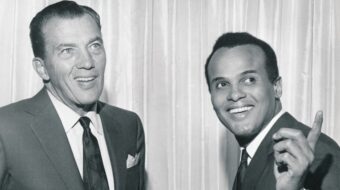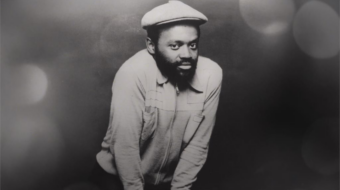
Frederic Rzewski (ZHEF-skee), American composer and pianist considered one of the most important serious music figures of our time, died of an apparent heart attack in Montiano, Italy, on June 26 at the age of 83.
His major compositions often incorporated social and political themes. They include the minimalist Coming Together, based on letters from Attica State Prison by Samuel Melville, and the hour-long piano variations The People United Will Never Be Defeated!, which is recognized worldwide as a modern classic.
Probably the single work by which Rzewski will be most remembered, The People United Will Never Be Defeated! (1975) is a set of 36 variations on the Chilean song “¡El pueblo unido jamás será vencido!” by Sergio Ortega and the Chilean singing group Quilapayún.
It received its world premiere on February 7, 1976, played by Ursula Oppens as part of the Bi-Centennial Piano Series at the John F. Kennedy Center for the Performing Arts Concert Hall. Rzewski dedicated the composition to Oppens, who had commissioned it, and who recorded it in 1979; the recording was named “Record of the Year” in that year by Record World, and received a Grammy nomination.
The song on which the variations is based is one of many that emerged from the Unidad Popular coalition in Chile between 1969 and 1973, prior to the overthrow of the Salvador Allende government. Rzewski composed the variations in September and October 1975, as a tribute to the struggle of the Chilean people against the newly imposed repressive regime of Augusto Pinochet. The work contains allusions to other leftist struggles of the same and immediately preceding time, such as quotations from the Italian traditional socialist song “Bandiera Rossa” (Red Flag) and the Bertolt Brecht-Hanns Eisler “Solidarity Song.”
The variations are short and build up to climaxes of considerable force. The 36 variations, following the 36 bars of the tune, are in six groups of six. The pianist, in addition to needing a virtuoso technique, is required to whistle, slam the piano lid, and catch the after-vibrations of a loud attack as harmonics: All of these are “extended” techniques in 20th-century piano writing. Much of the work uses the language of 19th-century romanticism but mixes this language with contemporary tonality, modal writing, and even serial techniques.
As in the Goldberg Variations by Johann Sebastian Bach, the final variation is a direct restatement of the original theme, intended to be heard with heightened significance after the long journey through the variations.
A performance by Stephen Drury on January 20, 2017, as part of the resistance to the incoming Trump regime, can be viewed and heard here.
Born April 13, 1938, in Westfield, Mass., Rzewski began playing piano at age 5. His parents were of Polish descent and he was raised Catholic. He attended Phillips Academy in Andover, Mass., Harvard, and Princeton. Randall Thompson, Roger Sessions, Walter Piston, and Milton Babbitt were among his teachers. In 1960, he went to Italy, a trip which was formative in his future musical development. In addition to studying with Luigi Dallapiccola in Florence on a Fulbright scholarship, he began a career as a performer of new piano music, often with an improvisatory element, and immersed himself in the electronic music scene.
In 1977, Rzewski became Professor of Composition at the Conservatoire Royal de Musique in Liège, Belgium, occasionally also doing short teaching stints at a number of other universities in the U.S. and abroad.
Many of Rzewski’s other works were also inspired by social and historical themes with a profound political consciousness. His North American Ballads (I. Dreadful Memories; II. Which Side Are You On?; III. Down by the Riverside; IV. Winnsboro Cotton Mill Blues) from 1978–79 are frequently performed and recorded; Night Crossing with Fisherman; Fougues; The Price of Oil; the Antigone-Legend, which features a principled opposition to the policies of the State, and which was premiered on the night that the U.S. bombed Libya in April 1986; and Mayn Yingele, a set of piano variations on a famous Yiddish song about a father who barely ever gets to spend time with his young son because he works so late every night at the factory.
The well-known musical scholar, critic, and wit Nicolas Slonimsky said of him in Baker’s Biographical Dictionary of Musicians (1993), “He is furthermore a granitically overpowering piano technician, capable of depositing huge boulders of sonoristic material across the keyboard without actually wrecking the instrument.”
A brief biography and a comprehensive list of the composer’s works and recordings can be found here.










